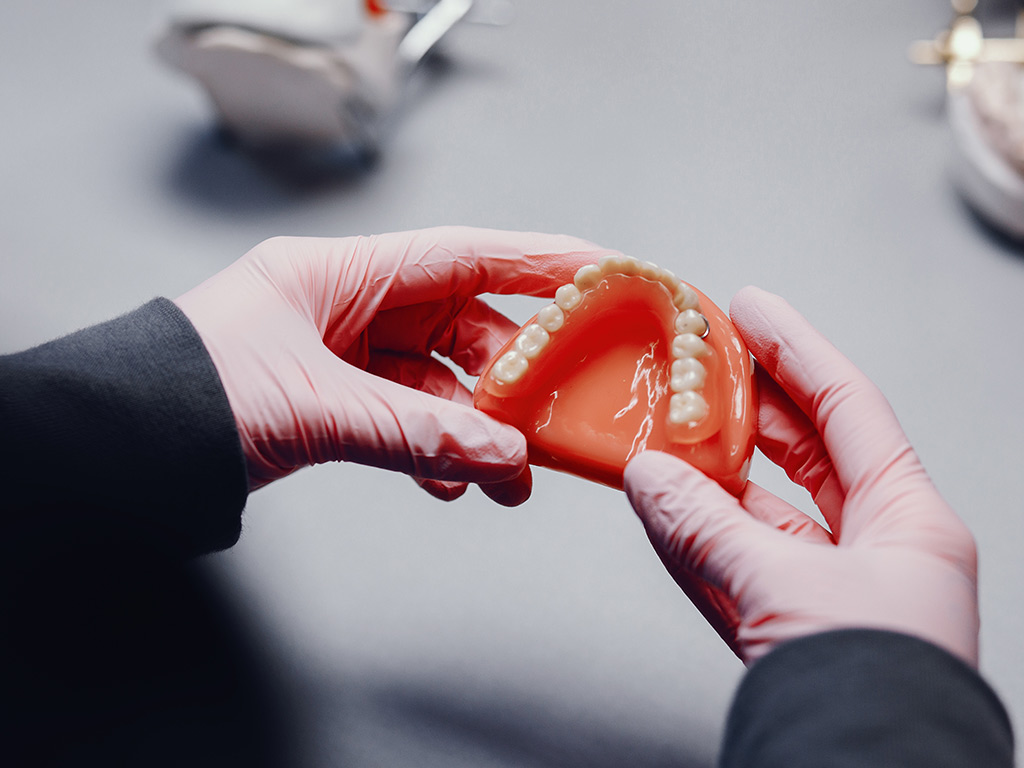 28 Oct 2021
28 Oct 2021
All about smiles dentures
Olds Denture & Implant Centre knows that the process of getting dentures or implants can be a stressful time for people. Which is why they strive to make this as easy and pain free as possible while providing the best care they can for their patients. This is an easy guide to many of the questions you may have regarding dentures and implants.
What are dentures and implants?
Dentures and implants are a set of artificial teeth, designed to provide you with all of the benefits of a full set of natural teeth such as:
- Restoring your ability to eat and chew food
- Defining your jaw line and improving your natural smile
- Helping to regain your ability to speak clearly and understandably
- Natural, healthy-looking gums
Typically, dentures today are made of resin or porcelain. The type of material that your dentures are made of can be one of the biggest influencers of cost, but could make a world of difference for you. Your dentist or denturist will be able to help you decide which is appropriate for you.
Types of Dentures
There are many types of dentures that your dentist or denturist may choose from, in this article, we will discuss the most commonly used.
These three types are:
The first is called a complete denture. This denture will sit on top of your gums and will be removable in full. This is made by your dentist after taking a mold of your mouth and making a model of it, making sure that the denture will sit comfortably in your mouth.
The second denture type is called a bridge or partial denture. This is made the same way as the complete denture but is designed to only fill a partial area of your mouth. Unlike implants, they use one or more of your surrounding teeth to hold on to the bridge – this will then fill the gap of missing teeth.
The third is called a dental implant. This is intended to replace only a few teeth in one section of your mouth. This is also removable for cleaning and comfortability purposes. They are attached to metal posts that are set beneath the gums, in the bones of your jaw. Implants offer a stronger bite and wont slip. These are usually implanted by an oral surgeon.
Is this process expensive?
There are many factors that contribute to the prices such as materials used to make the denture, any prescriptions needed for the patient, procedures needed to be done before and after to ensure the dental health and safety of the patient, and the aftercare of the dentures. Though they may seem expensive, this investment will prove its worth! Make an appointment with Olds Denture Centre today for your free consultation to clarify the cost.
How long does this process take?
Getting your mouth ready and having your dentures made, completely depends on the individual. The experience is different for many. There is groundwork to be done – in the way of having teeth pulled or treating an existing irritation or condition in the mouth. The dentist will then decide if you need a complete denture, a bridge or partial denture or if it is in your best interest to have a dental implant surgically put in.
Some patients may need to have teeth pulled beforehand as well. In this case, it will take time for the patients mouth to heal.
The dentist will then have to wait to take a mold of the patients’ mouth. When they are able to make the denture or implant, the dentist will need to be precise when making the dentures the correct size, shape, color and other specifications to match each individual patient perfectly.
Dentures need to be a specific size and shape for your mouth to reduce wear and injury to your mouth.
After being fitted for your dentures, It can take some time for you to be comfortable wearing them every day.
Does this hurt?
This process can be painful for some people, every patient’s experience is different and will depend on the amount of work needed to be done before or during this process. Having your teeth pulled and/or having other dental treatments (such as gum grafting) to ready the mouth for your dentures can be painful and uncomfortable.
After you have been fitted with dentures and are just starting to wear them, your gums can become irritated and may need lots of rest between uses. Your dentist should be able to make suggestions that can help with your comfortability and occasionally a ‘tweak’ is needed to be made.
How do I take care of my dentures?
When you have received your denture(s), you will be shown how to care for your dentures. It will be stressed to you that your denture will need to stay clean and wet. You should never let them dry out or go too long between cleans.
Dentures and implants that are too big, click, or don’t seem to fit well should be adjusted by your dentist right away.
A denture cleaning brush or soft toothbrush should be used to clean the denture. A hard brush should never be used to clean the denture because this may scratch it.
The dentist may recommend a non-abrasive paste-like Polident or another cleansing agent to keep them clean.
Dentures should be stored in a container of water or denture cleaning solution overnight while you sleep.
In the morning, take your dentures out of the water or solution and brush them gently to remove any debris or leftover adhesive before rinsing them and reapplying new adhesive or putting them back in your mouth. Denture adhesive should never be put directly into the mouth.
Dental implants should be cared for just like your natural teeth, with everyday brushing and flossing.
How do I keep my dentures in?
The dentist will give you a recommendation of which adhesive to use. This will be applied to the denture directly and never to the mouth directly. Always read the instructions and information pamphlet provided with the adhesive and be sure that you are not allergic to any of the ingredients.
First, clean and dry the denture and lightly brush your gums and rinse out your mouth. The adhesive should be applied to the denture in thin strips in the middle of the underside of the denture, not to close to the outside.
Press the denture to the gums and hold firmly for a few seconds up to a minute. Bite down if this will help you to hold it in place.
The denture should stay in place at this point. Dental implants do not need adhesive. Dentures that fit well should not need adhesive after you have gotten used to wearing them.
If at any time you find that your dentures or implants do not fit right and do not feel comfortable, you should repeat the process and make sure it is fitting properly before you try to eat food or bite down on anything.
If the denture needs to be adjusted in any way, you should make your dentist aware immediately.
Denture and Implant maintenance
Now that you have your denture(s)/implant(s) and know how to care for them, be sure that you book follow-up and maintenance appointments with your dentist as often as they recommend.
Dentures may need to be replaced or adjusted every 5 years, these appointments are important to maintain the health and safety of the patient. Broken or damaged dentures can result in cuts or bacteria build-up that can harm or injure the patient.
Call Olds Denture & Implant Centre today if you would like a free consultation to have all of your questions answered.
